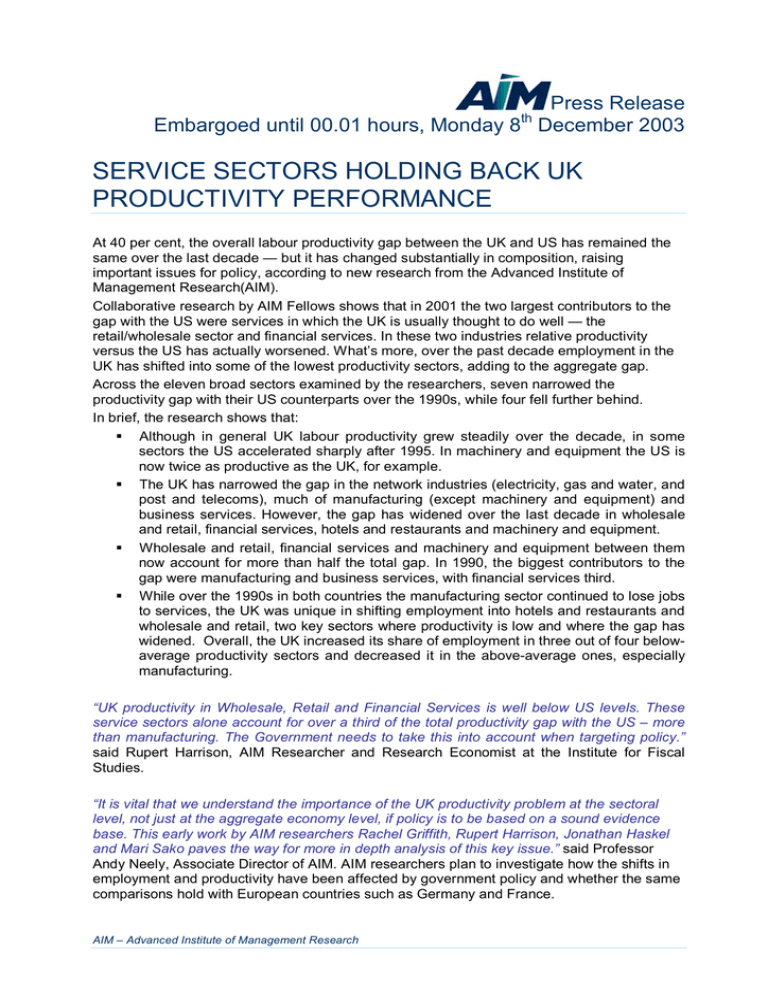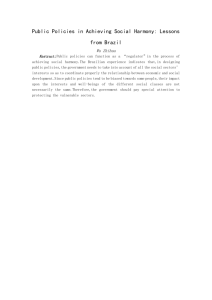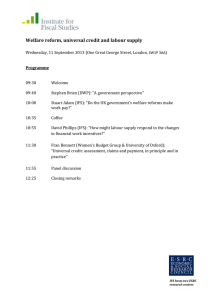SERVICE SECTORS HOLDING BACK UK PRODUCTIVITY PERFORMANCE Press Release
advertisement

Press Release Embargoed until 00.01 hours, Monday 8 December 2003 th SERVICE SECTORS HOLDING BACK UK PRODUCTIVITY PERFORMANCE At 40 per cent, the overall labour productivity gap between the UK and US has remained the same over the last decade — but it has changed substantially in composition, raising important issues for policy, according to new research from the Advanced Institute of Management Research(AIM). Collaborative research by AIM Fellows shows that in 2001 the two largest contributors to the gap with the US were services in which the UK is usually thought to do well — the retail/wholesale sector and financial services. In these two industries relative productivity versus the US has actually worsened. What’s more, over the past decade employment in the UK has shifted into some of the lowest productivity sectors, adding to the aggregate gap. Across the eleven broad sectors examined by the researchers, seven narrowed the productivity gap with their US counterparts over the 1990s, while four fell further behind. In brief, the research shows that: Although in general UK labour productivity grew steadily over the decade, in some sectors the US accelerated sharply after 1995. In machinery and equipment the US is now twice as productive as the UK, for example. The UK has narrowed the gap in the network industries (electricity, gas and water, and post and telecoms), much of manufacturing (except machinery and equipment) and business services. However, the gap has widened over the last decade in wholesale and retail, financial services, hotels and restaurants and machinery and equipment. Wholesale and retail, financial services and machinery and equipment between them now account for more than half the total gap. In 1990, the biggest contributors to the gap were manufacturing and business services, with financial services third. While over the 1990s in both countries the manufacturing sector continued to lose jobs to services, the UK was unique in shifting employment into hotels and restaurants and wholesale and retail, two key sectors where productivity is low and where the gap has widened. Overall, the UK increased its share of employment in three out of four belowaverage productivity sectors and decreased it in the above-average ones, especially manufacturing. “UK productivity in Wholesale, Retail and Financial Services is well below US levels. These service sectors alone account for over a third of the total productivity gap with the US – more than manufacturing. The Government needs to take this into account when targeting policy.” said Rupert Harrison, AIM Researcher and Research Economist at the Institute for Fiscal Studies. “It is vital that we understand the importance of the UK productivity problem at the sectoral level, not just at the aggregate economy level, if policy is to be based on a sound evidence base. This early work by AIM researchers Rachel Griffith, Rupert Harrison, Jonathan Haskel and Mari Sako paves the way for more in depth analysis of this key issue.” said Professor Andy Neely, Associate Director of AIM. AIM researchers plan to investigate how the shifts in employment and productivity have been affected by government policy and whether the same comparisons hold with European countries such as Germany and France. AIM – Advanced Institute of Management Research For copies of the AIM Briefing Note, ‘The UK Productivity Gap and the Importance of the Service Sectors’, Embargoed until 00.01 hours, Monday 8th December 2003 Saturday and Sunday contact Rachel Griffith on 07815 812151 From Monday contact Emma Hyman or Rupert Harrison on 020 7291 4800 or see www.aimresearch.org For details on AIM contact Professor Andy Neely. For details on the research contact any of the authors of the report. All contact details listed below. Notes for editors: AIM is a national research programme with a £20 million budget, co-funded by the Economic and Social Research Council (ESRC) and the Engineering and Physical Sciences Research Council (EPSRC). AIM’s mission is to improve understanding of management’s contribution to organizational performance, and thus UK well-being. AIM is initially focusing on three issues of particular relevance to management practice, government policy, and academic expertise: Productivity and other measures of performance for the 21st century. Innovation sustained in a competitive and social environment. Adaptation of promising practices in new settings Contact details for authors: Rachel Griffith is an AIM Research Fellow, Deputy Director of the Institute for Fiscal Studies and Reader at University College London. IFS, 7 Ridgmount Street, London WC1E 7AE, 020 7291 4800, 07815 812151 www.ifs.org.uk Rupert Harrison is an AIM Researcher and Research Economist at the Institute for Fiscal Studies. IFS, 7 Ridgmount Street, London WC1E 7AE, 020 7291 4800, www.ifs.org.uk Jonathan Haskel is an AIM Research Fellow and Professor of Economics at the Department of Economics, Queen Mary, University of London. Queen Mary, University of London, Mile End Road, London, E1 4NS, 020 7882 5365 www.econ.qmul.ac.uk Mari Sako is an AIM Research Fellow and Professor of Management Studies at Said Business School. University of Oxford, Park End Street, Oxford OX1 1HP, 01865 288 925, www.sbs.ox.ac.uk Contact details for Andy Neely: Andy Neely is Associate Director of AIM and Chairman of the Centre for Business Performance at Cranfield School of Management. AIM, 6-16 Huntsworth Mews, London Business School, London, NW1 6DD, 0870 734 3000 www.aimresearch.org AIM – Advanced Institute of Management Research



